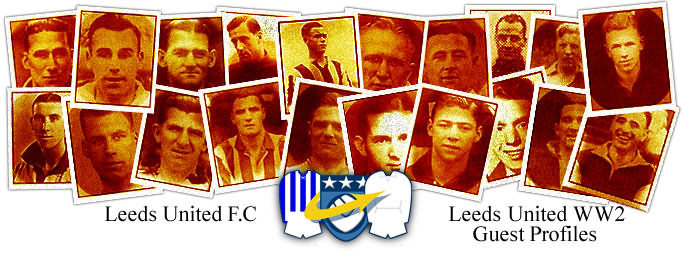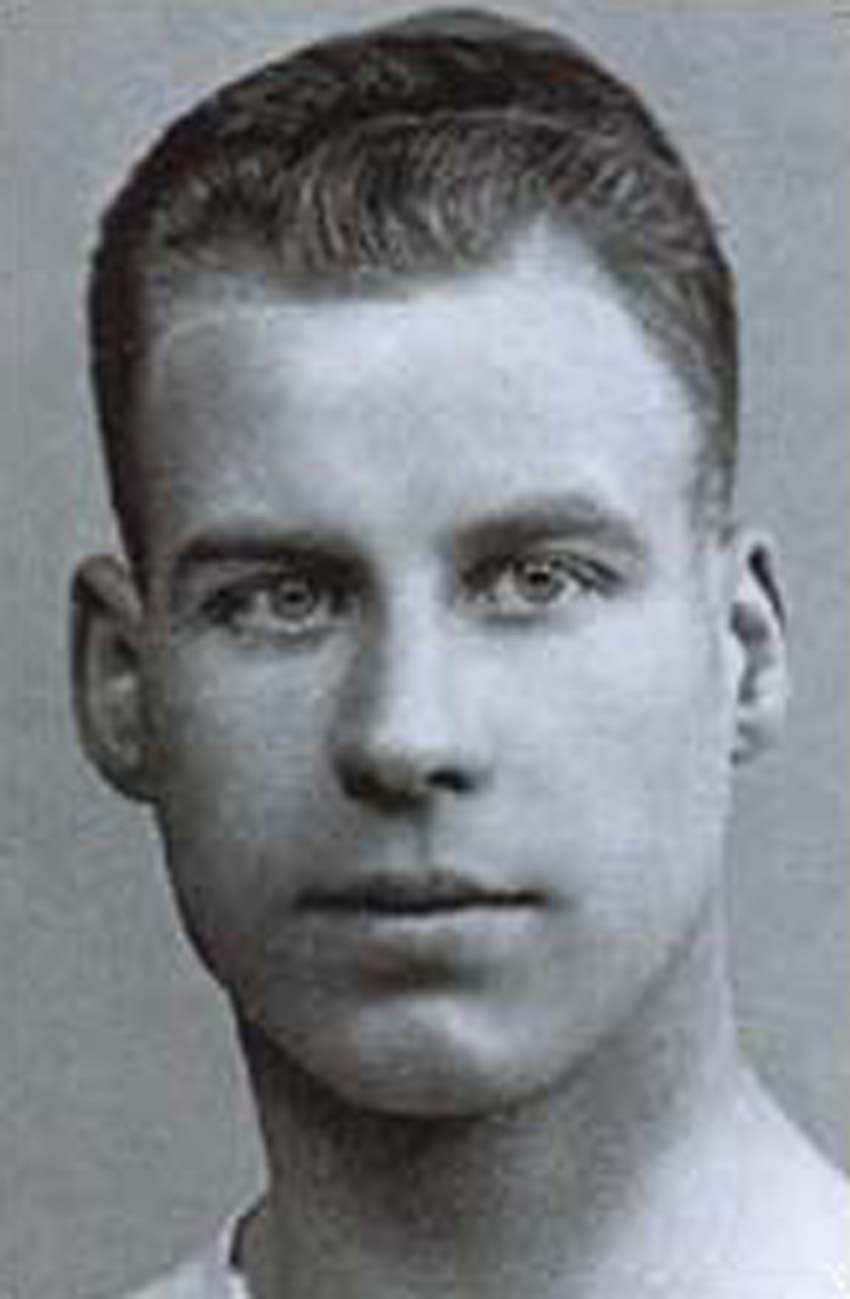

Goslin: Henry (Harry)
WW2 Guest: 1940-1941
(Leeds United War-time Guest Player Details)
Wing Half
Born: Willington, Co. Durham: 09-11-1909
Debut: v Huddersfield Town (a): 05-10-1940
Height & Weight: Unknown
Goslin first played for Boots Athletic before being signed by First Division Bolton
Wanderers in 1930 for £25. He made his debut on 10th September 1930 in a 2-7 defeat by
Liverpool at Anfield but despite the score he kept his place for the rest of the season. He
was not a regular in the following season but played more than half the games as Bolton
succumbed after several seasons of fighting relegation and dropped into the Second Division
in 1932-33. They were third in the following season and then 1934-35 they were promoted as
runners-up to Brentford with Goslin an ever-present. He missed only eight games in five
seasons as Bolton started to consolidate their First Division status with top ten finishes.
When World War Two brought an end to the Football League fixtures he had scored twenty-three
goals, eight of which were penalties in three hundred and three League appearances, plus
three games in the aborted 1939-40 season and had also played in thirty-one F.A. Cup ties.
On 8th April 1939 before the home game with Sunderland, as Captain of Bolton Wanderers,
Goslin addressed the crowd and said “We are facing a national emergency. But this danger can
be met, if everybody keeps a cool head, and knows what to do. This is something you can't
leave to the other fellow, everybody has a share to do.” Of the thirty-five players on the
staff of Bolton Wanderers, thirty-two joined the armed services and the other three went
into the coal mines and munitions. Harry Hubbick resumed his career in the mines and Jack
Atkinson and George Hunt served in the local Police force. Seventeen players including Harry
Goslin, Stan Hanson, Ray Westwood, Danny Winter, Albert Geldard, Billy Ithell, Tommy
Sinclair, Don Howe, Ernie Forrest, Jackie Roberts and Jack Hurst joined the 53rd (Bolton)
Field Regiment. At first the men continued to play for their club and Goslin played for
Wanderers in four of the games in the 1939-40 North-East Regional League. He also guested
with Bradford City, Chelsea, Norwich City and Leeds United. He was also chosen to represent
England in four War-time Internationals. The first being against Scotland at St James’ Park
Newcastle on 2nd December 1939 at Right Half, in which he captained England to a 2-1 victory.
On 12th May 1940 Germany invaded France and the 53rd (Bolton) Field Regiment was sent to help
the French and came under fire from advancing Panzer Divisions. Harry Goslin was credited
with destroying four enemy tanks and he was promoted to the rank of Lieutenant. Goslin, Howe,
Hanson, Hurst, Forrest and Westwood were lucky enough to make it back to Dunkirk where they
were rescued by British ships. The 53rd (Bolton) Field Regiment spent the rest of 1940 and
most of 1941 at various camps around Britain. This enabled them to play the occasional game
for Bolton Wanderers in the North-East League. It was in this period that he played his
three games as a guest for Leeds United. All his games were at Right Half in the 1940-41
North Regional League. His first was on 5th October 1940 in a 1-1 draw at Huddersfield Town,
followed on 4th January 1941 by the first of two successive games with Chesterfield, at
Saltergate in a 4-2 win and the following week in a 2-3 loss at Elland Road. He had also
played one Wartime game in 1939-40, three in 1940-41 and six games in 1941-42 season for his
own club, Bolton Wanderers. He also played once for Bradford City in 1940-41, once for
Chelsea in 1941-42 and six times for Norwich City in the same season. On 3rd May 1941, Goslin
was selected to play for England at Right Half against Scotland at Hampden Park in a 3-1
English victory. He also played at Right Half against Scotland at Wembley in a 2-0 win on 4th
October 1941 and again at Right Half in a 2-1 win over Wales at St Andrews’ Birmingham on 25th
October 1941. On 15th July 1942, the 53rd (Bolton) Field Regiment was mobilised for overseas
service. The following month they arrived in Egypt and immediately became involved in defending
Alam el Halfa. On 30th August 1942, General Erwin Rommel attacked Alam el Halfa but was
repulsed by the Eighth Army. General Montgomery responded to this attack by ordering his troops
to reinforce the defensive line from the coast to the impassable Qattara Depression. Montgomery
was now able to make sure that Rommel and the German Army was unable to make any further
advances into Egypt. On 22nd October 1942, the 53rd (Bolton) Field Regiment took up battle
positions. The following day General Montgomery launched Operation Lightfoot with the largest
artillery bombardment since the First World War. The attack came at the worst time for the
German Afrika Corps as Rommel was on sick leave in Austria. His replacement, General George
Stumme, died of a heart-attack the day after the nine hundred gun bombardment of the German
lines. Stumme was replaced by General Ritta Von Thoma and Hitler phoned Rommel to order him to
return to Egypt immediately. The Germans defended their positions well and after two days the
Eighth Army had made little progress and Montgomery ordered an end to the attack. When Rommel
returned, he launched a counterattack at Kidney Depression on 27th October 1942. Montgomery
now returned to the offensive and the 9th Australian Division created a salient in the enemy
positions. Churchill was disappointed by the Eighth Army's lack of success and accused
Montgomery of fighting a "half-hearted" battle. Montgomery ignored these criticisms and instead
made plansfor a new offensive, Operation Supercharge. On 1st November 1942, Montgomery launched
an attack on the German Afrika Corps at Kidney Ridge. After initially resisting the attack,
Rommel decided he no longer had the resources to hold his line and, on the 3rd November 1942,
he ordered his troops to withdraw. However, Hitler overruled his commander and the Germans were
forced to stand and fight. The next day Montgomery ordered his men forward. Lieutenant Harry
Goslin and the 53rd (Bolton) Field Regiment joined the pursuit. The Eighth Army broke through
the German lines and Rommel, in danger of being surrounded, was forced to retreat. Those
soldiers on foot, including large numbers of Italian soldiers, were unable tomove fast enough
and were taken prisoner. The British Army recaptured Tobruk on 12th November 1942. During the
El Alamein campaign half of Rommel's one hundred thousand man armywas killed, wounded or taken
prisoner. He also lost over four hundred and fifty tanks and one thousand guns. The British and
Commonwealth forces suffered thirteen thousand five hundred casualties and five hundred of
their tanks were damaged. However, of these, three hundred and fifty were repaired and were
able to take part in future battles. After spending time in Baghdad, the 53rd (Bolton) Field
Regiment moved to Kirkurk on 8th January 1943. Theywere eventually relocated to Kifri which
was to become their main base for the next five months. While there Harry Goslin, Stan Hanson,
Don Howe and Ernie Forrest played for the British Army against the Polish Army in Baghdad.
Howe scored one of the goals in the 4-2 victory. The 53rd (Bolton) Field Regiment joined
General Montgomery and the Eighth Army in the invasion of Italy. On 24th September 1943,
Goslin and his men landed at Taranto. Three days later the men had reached Foggia without
too much opposition. However, when the men were ordered to cross the River Sangro the regiment
took part in some of the most difficult fighting of the Second World War. At the end of
November Don Howe was wounded and evacuated to a dressing station. After another enemy air
attack Ray Westwood and Stan Hanson came close to being killed. The shelling continued and on
14th December 1943, Harry Goslin was hit in the back by shrapnel and seriously wounded from a
mortar explosion. He died from his wounds four days later, on 18th December 1943. The Bolton
Evening News reported: "Harry Goslin was one of the finest types professional football breeds.
Not only in the personal sense, but for the club's sake, and the game's sake. I regret his
life has had to be sacrificed in the cause of war." He was awarded the Military Cross.